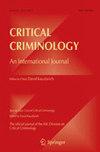监狱惩罚的范围有多大?数字化社会中的再入过程
IF 1.1
3区 社会学
Q2 CRIMINOLOGY & PENOLOGY
引用次数: 0
摘要
摘要:本文探讨了在数字化社会中惩罚的延伸范围,重点关注了长期服刑人员释放和重新进入监狱过程的复杂性。本文借鉴Gilles Deleuze的“控制社会”概念和Nils Christie的“密集而松散的社会”概念,讨论了挪威数字化社会背景下的重新进入。通过以人为本的多地点实地调查,该分析确定了关于重返社会过程的三种复杂性。第一个是小而不可预见的事件如何能够重置出狱时间。第二是公共福利服务中的数字看门人如何在重新进入过程中制造障碍。第三,在线跟踪和监控的可能性如何提供新的社会控制形式和释放后的痛苦,这创造了一个环境,一个人的犯罪过去影响了他或她的日常生活。本文挑战了监狱内外的二元科学理解,并提供了数字惩罚和新形式控制如何在数字化社会中发生的过程的见解。通过这种方式,本文分析有助于讨论挪威刑事政策中刑满释放后成为自由人的规范要求在数字化社会中如何变得更加复杂。本文章由计算机程序翻译,如有差异,请以英文原文为准。
How Far does Prison Punishment Extend? Re-entry Processes in the Digitalised Society
Abstract This article questions how far punishment extends in a digitalised society, focusing on the complexities in relation to prison release and re-entry processes for people who have served a long prison sentence. Drawing on Gilles Deleuze’s concept of “societies of control” and Nils Christie’s concepts of “dense and loose societies,” the article discusses re-entry within the context of the Norwegian digitalised society. Through person-centred, multi-site fieldwork, the analysis identifies three types of complexities regarding re-entry processes. The first is how small and unforeseen events can reset the time of release from prison. The second is how digital gatekeepers in public welfare services create obstacles in the re-entry process. The third is how the possibility of online tracking and monitoring provides new forms of social control and pain after release, which creates an environment where a person’s criminal past affects his or her everyday life. This article challenges binary scientific understandings between the inside and the outside of prison and provides insights into the processes of how digital punishment and new forms of control occur in digitalised society. In this way, the article analytically contributes to the discussion of how the normative demand of being a free person after completing sentences in Norwegian criminal policy has been further complicated in a digitalised society.
求助全文
通过发布文献求助,成功后即可免费获取论文全文。
去求助
来源期刊

Critical Criminology
CRIMINOLOGY & PENOLOGY-
CiteScore
3.30
自引率
16.70%
发文量
70
期刊介绍:
Critical Criminology is the official journal of the ASC Division of Critical Criminology.
The journal deals with questions of social, political and economic justice. Critical Criminology is for academics and researchers with an interest in anarchistic, cultural, feminist, integrative, Marxist, peace-making, postmodernist and left-realist criminology. The journal does not limit the scope of the inquiry to state definitions of crime and welcomes work focusing on issues of social harm and social justice, including those exploring the intersecting lines of class, gender, race/ethnicity and heterosexism. The journal is of interest for all persons with an interest in alternative methodologies and theories in criminology, including chaos theory, non-linear analysis, and complex systems science as it pertains to the study of crime and criminal justice. The journal encourages works that focus on creative and cooperative solutions to justice problems, plus strategies for the construction of a more inclusive society.
 求助内容:
求助内容: 应助结果提醒方式:
应助结果提醒方式:


